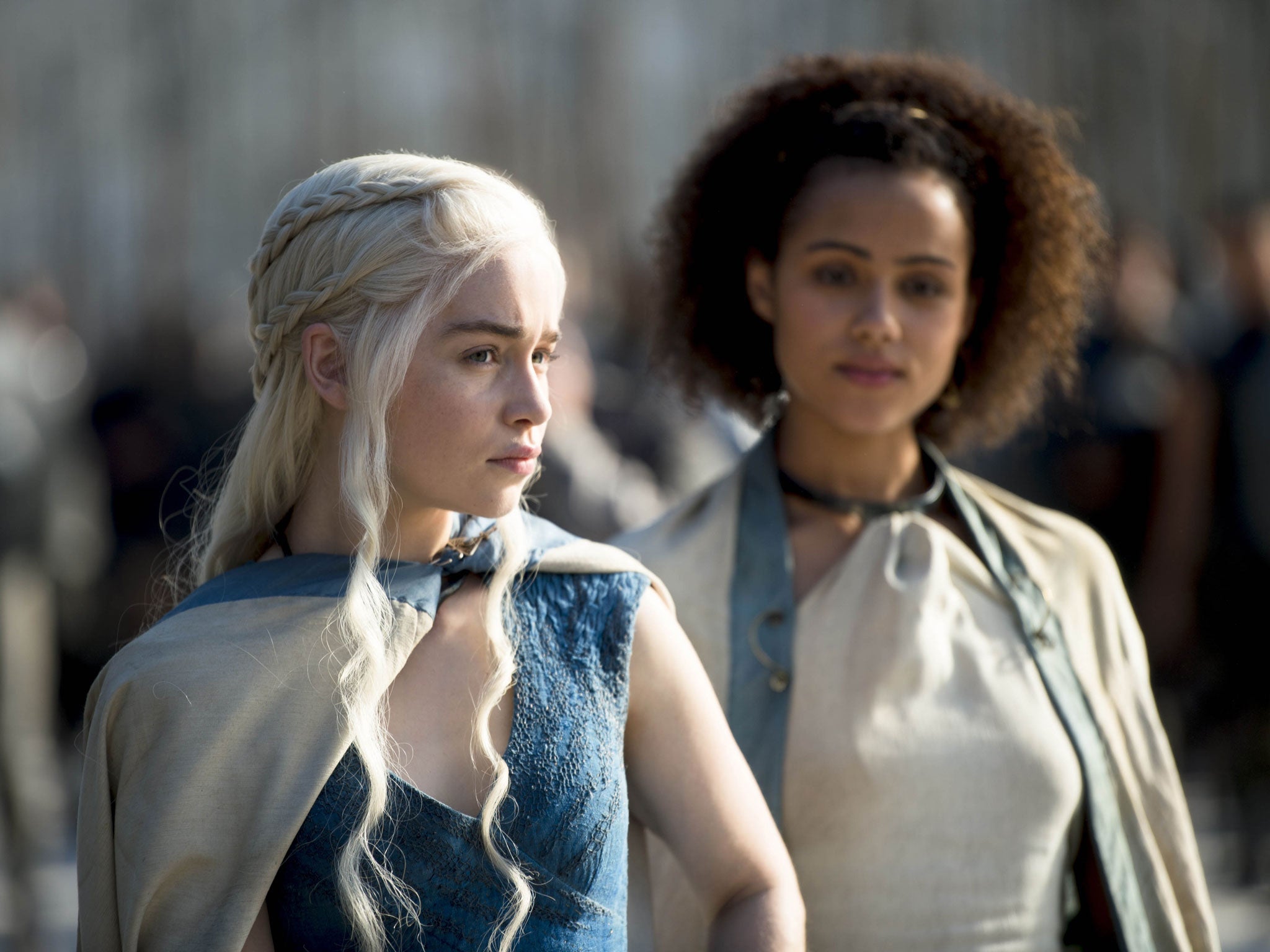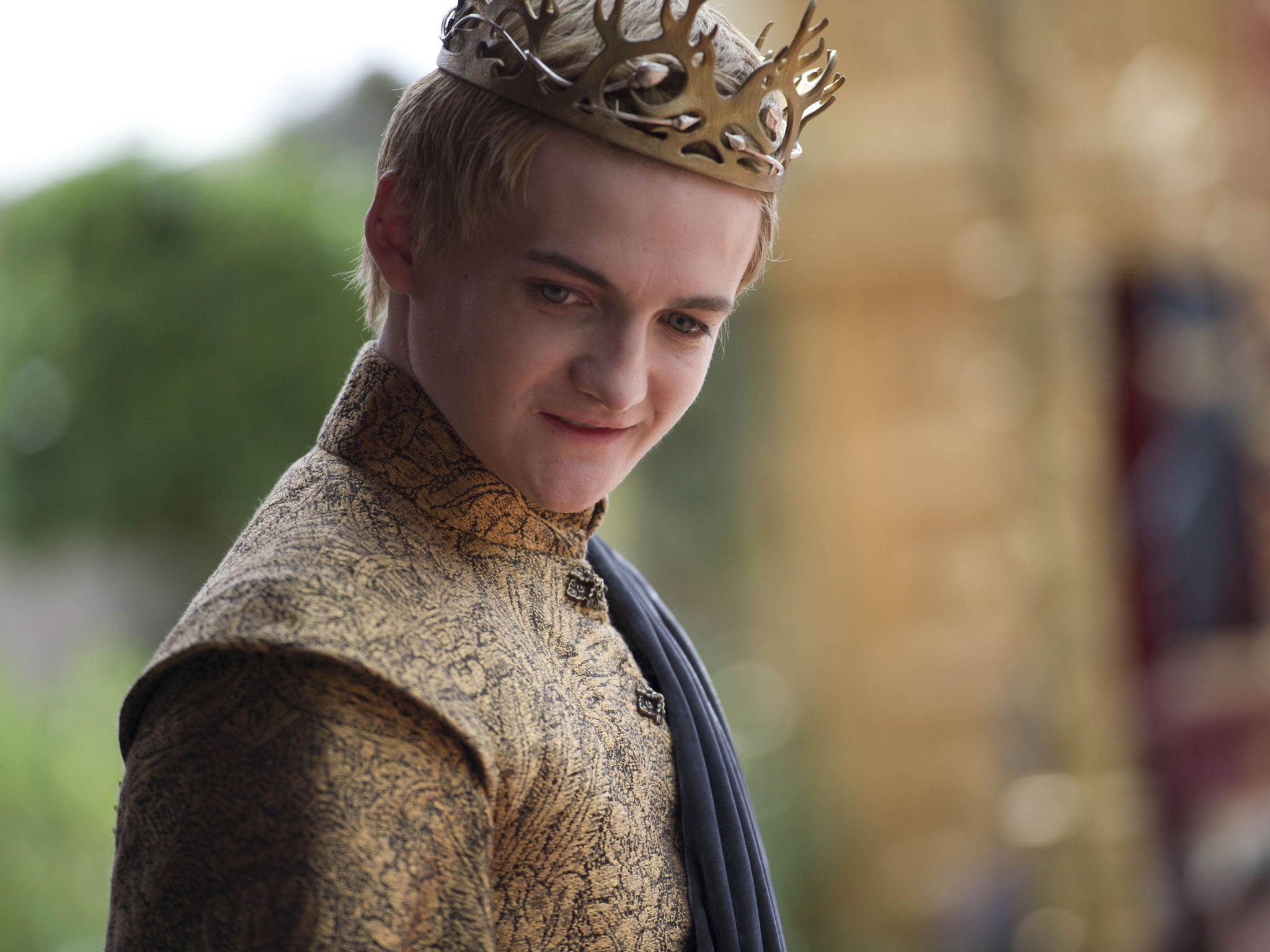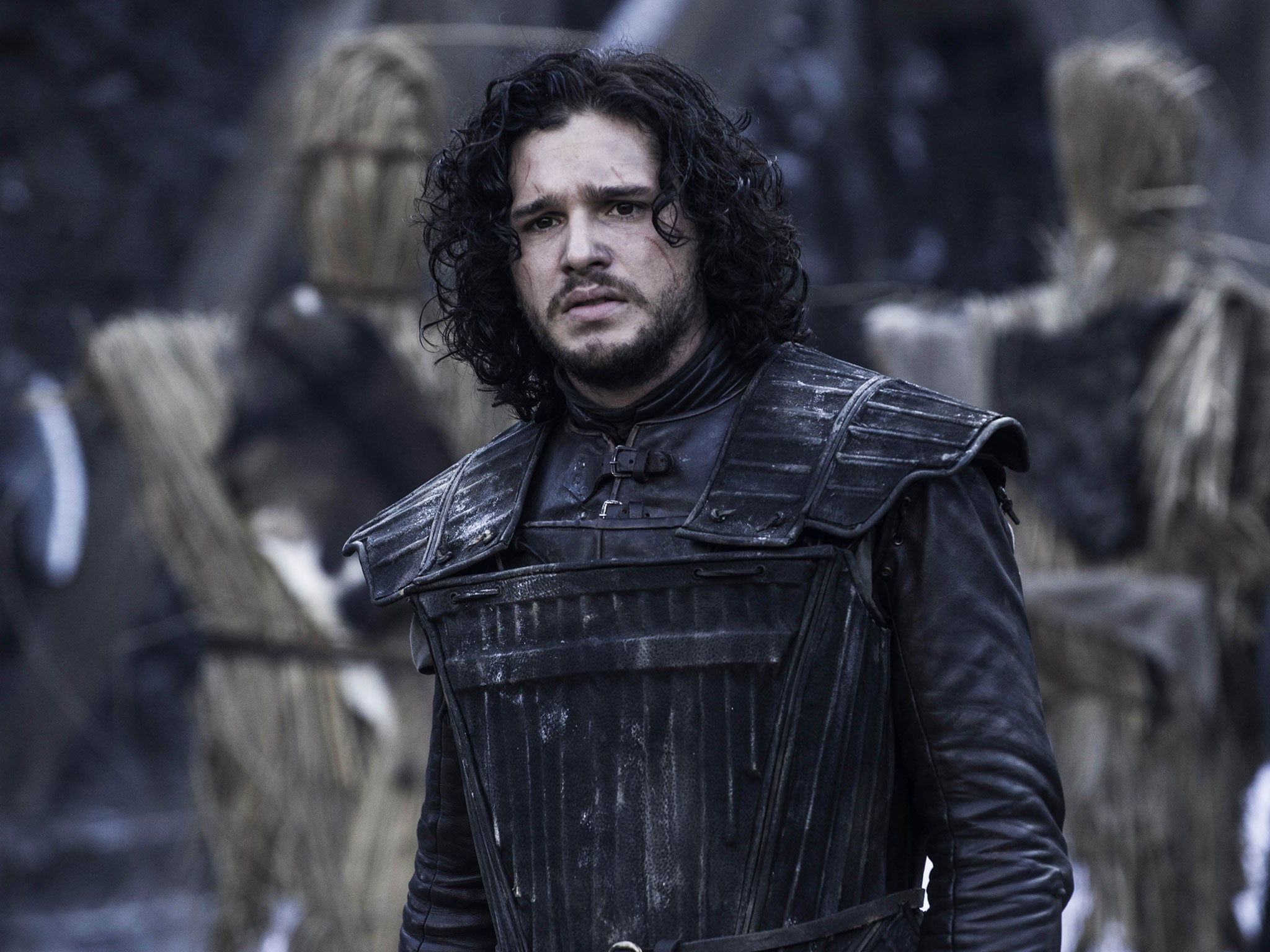Machiavelli with magic and dragons: The allure of Game of Thrones

Your support helps us to tell the story
From reproductive rights to climate change to Big Tech, The Independent is on the ground when the story is developing. Whether it's investigating the financials of Elon Musk's pro-Trump PAC or producing our latest documentary, 'The A Word', which shines a light on the American women fighting for reproductive rights, we know how important it is to parse out the facts from the messaging.
At such a critical moment in US history, we need reporters on the ground. Your donation allows us to keep sending journalists to speak to both sides of the story.
The Independent is trusted by Americans across the entire political spectrum. And unlike many other quality news outlets, we choose not to lock Americans out of our reporting and analysis with paywalls. We believe quality journalism should be available to everyone, paid for by those who can afford it.
Your support makes all the difference.Game of Thrones is no hokey fantasy. It’s the most trenchant, brave and brutal examination of power on television.
Early in Game of Thrones' second series, a scheming courtier called Littlefinger issues a thinly veiled threat to the Queen, Cersei Lannister, who is widely known to be conducting an incestuous affair. "Sometimes, I've heard even brothers and sisters develop certain affections," he suggests, as the pair walk through a balmy courtyard accompanied by four royal guards. "Prominent families often forget a simple truth, I've found... knowledge is power." He gives a punchable little smirk. And this is where many dramas would cut, content to move on to the next beat with this Machiavellian insight intact.
Not Game of Thrones. Not Cersei, who, like just about every character here, relies on a bald, practical wisdom that makes The Prince look like an Edwardian etiquette manual. She gives Littlefinger an appraising look, and then orders the guards to cut his throat. They seize him. At the last moment, she calls them off. She tells them to take three steps backwards. She tells them to turn around. She tells them to close their eyes. They do all of this without hesitation or dissent. As Littlefinger takes stock, Cersei gives him a condescending look that almost shades into pity. Knowledge is power? No it isn't, don't be silly, says Cersei. "Power is power."
That exchange gets to the heart of Game of Thrones' unsentimental, unconventional style, its disruption of every safe cliche with a cruel, antic practicality. More than that, though it gets to the heart of what it's about. Most of the great American television shows of the last decade - Breaking Bad, Mad Men, The Sopranos - have examined the same thing: identity, the discovery of who you really are. Game of Thrones is sort of interested in that question, but what's going on on the inside only really takes centre stage when someone's guts are strung across the screen. The nature of the self is only important as an adjunct to another matter, which Cersei knows counts for much more, both as a means and an end: power. How you take it, how you wield it, and what pitiless clarity it takes to hold on to it.
With at least five dysfunctional factions at war for the iron throne of Westeros, allegedly forged from the 1,000 enemies' swords surrendered to the nation's first king, this is no easy task. The show is the dramatisation of a struggle between different conceptions of power in a kingdom where even the freest spirit bends his knee to someone: power as birthright, power as holy gift, power as reward for goodness. Ultimately, though, it always come down to one thing: power as a ruthless performance of strength. As Cersei says much later: "This is what ruling is; lying on a bed of weeds, ripping them out by the root, one by one, before they strangle you in your sleep". Or as Littlefinger puts it, expressing his satisfaction at the national crisis that terrifies another character: "Chaos isn't a pit. Chaos is a ladder."
Power, it will be clear, is not a happy subject, and so while I am looking forward to the fourth series, which begins on Sky Atlantic on Monday, it is a panicky sort of anticipation. So many horrible things have already happened in Westeros - but I am grimly certain that life is only going to get worse.
Power is familiar territory for fantasy epic, but it is not normally examined so unflinchingly. Because fantasy is such an immediate turn-off for so many people, most of the examples that make it out of the nerd ghetto - Lord of the Rings chief among them, of course - have their escape justified by an appeal to the safest kind of story: the triumph of good over evil. This childish tendency was memorably described by the sci-fi writer Michael Moorcock as 'Epic Pooh'. I came to Game of Thrones shortly after seeing the first part of The Hobbit, Peter Jackson's indulgent Tolkien adaptation that hews closely to all the most tiresome tropes of the genre, and, despite HBO's fine track record for making genres dirty, I was ready to dismiss it in the same way.

Then - and here comes a spoiler, although if you're reading a piece ahead of the fourth series when you haven't caught up with the beginning of the first one then to my mind you've only got yourself to blame - I watched a nimble 10-year-old, Bran, climb an abandoned tower. At the top, Bran - the highborn son of Sean Bean's Ned Stark, the Lord of Winterfell and Warden of the North - found Cersei and her brother-lover Jaime in the act. Two options seemed to be available: that the affair would be revealed, or that Bran would be intimidated into silence. When Jaime caught the boy by his shirt, I assumed it would be the latter. But in Westeros, as we have seen, information is far less useful than a big stick, and the calculation is always a simple one. And so, instead, Jaime gave a little shrug to Cersei. "The things I do for love," he sighed. Without looking at Bran again, he gave him a playful, slapstick shove out of the window. It wasn't even that big a deal. The show cut to black, and I was hooked.
There are, I think, those among the uninitiated who sneer at Game of Thrones even today. They see the dragons and the bludgeons and the mountains and the jerkins and they roll their eyes and wonder how everyone got so involved in such a silly piece of escapism. These people, happily fewer in number with every passing series, are entirely mistaken.

Watch Apple TV+ free for 7 days
New subscribers only. £8.99/mo. after free trial. Plan auto-renews until cancelled

Watch Apple TV+ free for 7 days
New subscribers only. £8.99/mo. after free trial. Plan auto-renews until cancelled
One good piece of evidence is the superlative Peter Dinklage's explanation for taking the part of Tyrion Lannister, the dwarf brother of Cersei and Jaime. Dwarves are 10-a-penny in fantasy, but this one is not a member of a stout-hearted, pugnacious and semi-adorable species that live under a mountain: this one is the simply product of a genetic mutation. "It just seemed like something I had never come across before," Dinklage told Vanity Fair, "especially in the fantasy genre, which I still refuse to call this, even though we have dragons. It is just something that I was so eager to embrace, because it turned the dwarf stereotype in the fantasy genre on its head... I just feel like this character, Tyrion, was a complete human being. Shock!"
Likewise the last remaining members of the Targaryen family, who have such an ethereal, milky look that when they first appeared I thought of Tolkein's elves; as it turns out, though, they are just ordinary humans, and their physical similarity is not the product of their species, but of generations of incest. There is plenty of magic, to be sure, from dragons to the zombie-like White Walkers, and, as the show goes on, the grip of the supernatural is becoming ever creepier and harder to ignore. But everyone who matters is, first and foremost, a human being. And everything that is fantastical is subordinate to them.
In the ways that count, then, Game of Thrones isn't escapist at all. Despite its cynicism, it is more piercingly truthful about its characters than any number of realist shows that diminish them into types. (I find its examination of power infinitely more convincing than the one conducted by Netflix's House of Cards, for example). It is also terribly cruel, partly in the deaths it doles out, and partly in the secret human selfishness that these murders expose. Although Bran survives, crippled, his treatment sets a precedent: no one ever seems to be safe. "When my characters are in danger," says George RR Martin, on whose books the series is based, "I want you to be afraid to turn the page... you need to show right from the beginning that you're playing for keeps."

This use of the unconventional death - the trick, basically, being to establish someone as a protagonist, and then to swiftly kill them - is not actually anything new. Spooks did it, splashing Lisa Faulkner all over the trailers and then swiftly dunking her head in a deep fat fryer. Line of Duty did it, introducing Jessica Raine at the start of the second series and then killing her off before the end of the first episode. It is an effective technique, but also a familiar one.
But Game of Thrones takes it further. The trick here is less in the significance of the death than it is in the pettiness of the cause. In Westeros, life is cheap. Killing someone is a fine way to express your irritation at the sound of their whistle so long as the law and your conscience are inoperative. We're back to power again: the ugly certainty that you only retain your ability to kill if you consistently exercise it.
That big death at the end of series one doesn't feel inevitable or justified; it feels almost arbitrary, the engine of its inevitability nothing but sadism. Later on, a matter of mostly social offence leads to an astonishing massacre, one of the most gobsmacking scenes I've ever seen on TV. In between, people are always getting maimed or murdered for no reason at all - not the goons falling from the fire escape that we're all used to from thrillers, but people you really care about. And because the cast is so big, the world so sprawling, your attachment to anybody comes with the certain knowledge that they are dispensable, their death just another tiny fracture in the show's tectonically slow movement towards a resolution.
The deaths are frequently executions, robbing each presentation of the kinetic energy that makes a battle so easy to watch, and to forget. Even when they do come in battle, they are generally preceded by a grim moment in which the victim knows that his time is up. They are also despicably entertaining. People are sliced into surprising new geometric configurations, or have a sudden amputation followed by a queasy burst of rock music. I have a visceral recollection of a scene that opens with a head being hammered unceremoniously onto a stake. Like the well-trailed nudity, this tendency is both exploitative and essential: it also serves to make Westeros's depravity concrete, and it makes us helplessly, appalledly complicit. (The only bum note, a multi-episode torture sequence that became irredeemably exploitative, was flawed precisely because there was nothing seductive about its evil.) In this way, our sympathy is extended to psychopathic mass-murderers when in other shows mere adulterers find themselves beyond its scope. And all this means that when something that seems genuinely bad happens, it is very bad indeed.
Series three climaxed with just such a catastrophe, a Jacobean revenge horror that didn't so much change the rules of the game as pick up every piece on the board and put it down somewhere new. I can't wait to see what happens next. The battle for power, it's been hinted, will soon look insignificant next to a terrible external threat that is still only a fringe concern; and the Targaryen dragons are getting bigger every year.
Interesting as the dragons are, though, they aren't half as interesting as the people who would like to have control of them. Will the White Walkers that threaten them all do anything to diminish their appetite for the throne? It seems unlikely. The realm is hardly any less attractive for being in danger. As Littlefinger puts it: "The realm? Do you know what the realm is? It's the 1,000 blades of Aegon's enemies, the stories we agree to tell each other over, and over, until we forget that it's a lie."
The fourth series of 'Game of Thrones' starts on Monday at 2am on Sky Atlantic, repeated 9pm
Join our commenting forum
Join thought-provoking conversations, follow other Independent readers and see their replies
Comments